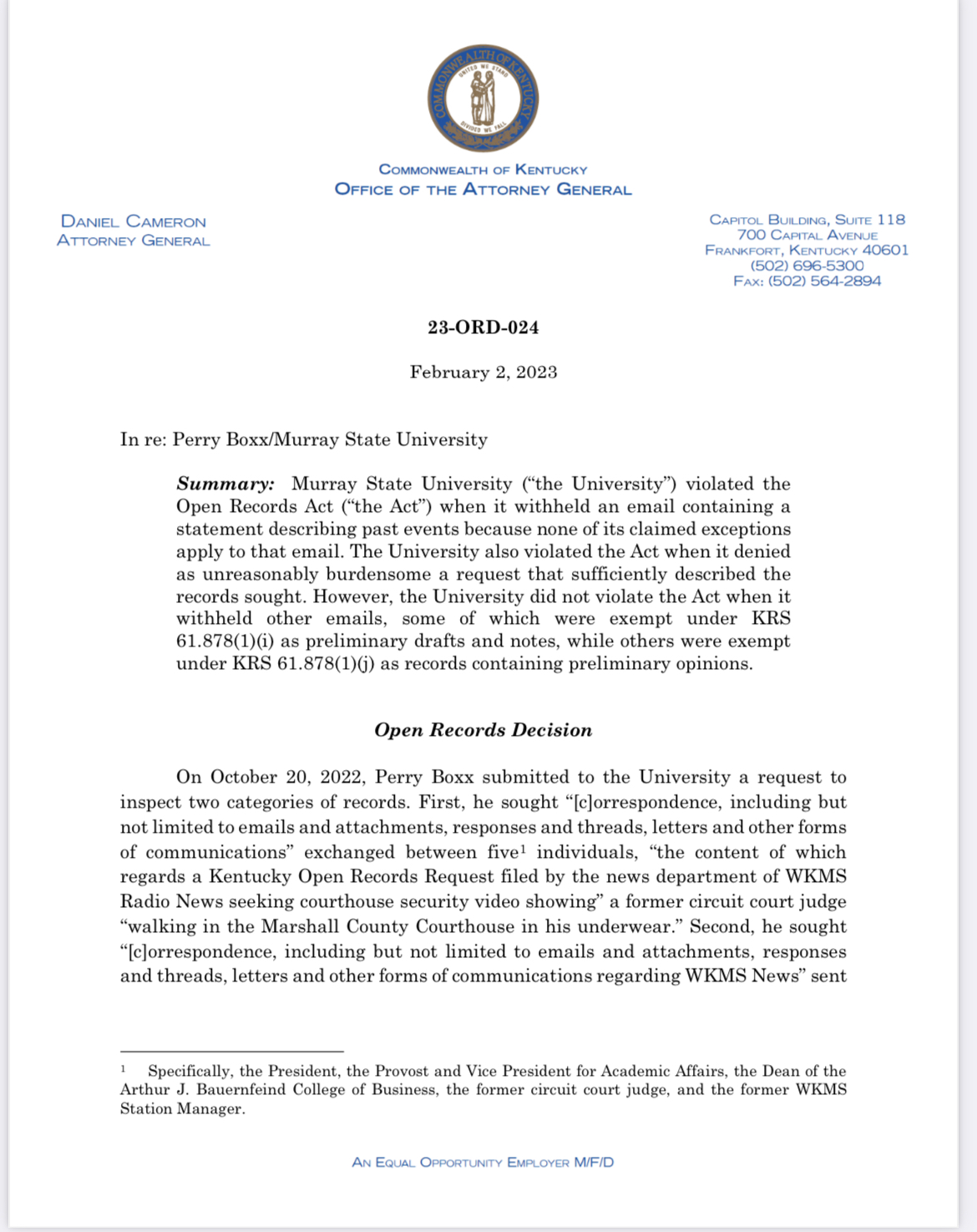
In an important legal development nearly overlooked in the chaos of the recently resumed legislative session, the Office of the Attorney General has rejected Murray State University’s reliance on the First Amendment to deny WPSD news director Perry Boxx's open records request.
But Boxx still comes up largely empty handed under the attorney general's decision issued on February 2.
https://www.ag.ky.gov/Resources/orom/2023-OROM/2023/23-ORD-024.pdf
With few exceptions, the OAG affirmed Murray State’s characterization of the remaining responsive records as preliminary documents excluded from public inspection by KRS 61.878(1)(i) and (j).
https://apps.legislature.ky.gov/law/statutes/statute.aspx?id=51393
In October, 2022, Boxx requested university correspondence between named officials relating to an earlier records request submitted by WKMS — Murray State’s public radio station — to the Administrative Office of the Courts. WKMS requested courthouse security video of former Circuit Court Judge Jamie Jameson “walking in the Marshall County Courthouse in his underwear.”
Boxx also requested correspondence between named individuals “regarding WKMS.”
(In November, 2022, the Judicial Conduct Commission removed Jameson from the bench following a hearing on seven charges — including the charge that Jameson “use[d] the power and prestige of [his] office” to pressure Chad Lampe — WKMS’s former station manager — “to stop reporting an unflattering story about Judge Jameson walking around the Marshall County Courthouse in his underwear.”)
Addressing the university’s claim that protection of press freedom under the First Amendment’s is an exception to inspection of public records incorporated into the open records under KRS 61.878(1)(k) — which exempts from inspection “public records or information the disclosure of which is prohibited by federal law”— the attorney general observed:
“Although the First Amendment is ‘federal law,’ it does not, on its face, ‘prohibit’ the disclosure of any public records. . . .The University cites no binding or persuasive legal authority holding that the First Amendment shields a government-funded news organization’s records from its state’s open records law.”
Whatever questions the attorney general’s analysis of the university’s invocation of the First Amendment as the basis for denial raises, “[b]y its plain terms, Mr. Boxx’s open records request does not seek records that invade WKMS’s news-gathering process.”
Rather, Boxx’s attorneys Jon Fleischaker, Michael Abate, and Rick Adams asserted, “it seeks communications between certain MSU administrators, Judge Jameson, and/or Chad Lampe that will reveal the extent of Judge Jameson’s and MSU administrator’s coordinated effort to pressure Mr. Lampe into stopping publication of a story unflattering to Judge Jameson.”
The attorney general also summarily rejected Murray’s unsubstantiated claims that Boxx’s requests were insufficiently specific and unduly burdensome.
But in the final analysis, the attorney general affirmed Murray State University’s reliance on the preliminary documents exceptions in denying Boxx access to the majority of the public records identified in his request verifying the extent to which university officials yielded to Jameson’s pressure to kill a WKMS story that cast him in an embarrassing light. The attorney general characterized the protected records as “emails that were preliminary drafts, and discussions of those drafts, regarding a proposed response to a media inquiry or emails constituting nothing more than ‘for your information’ types of notes.”
And that is where the story ends — for now. Boxx, who is ably represented in this matter by premier open government attorneys from Kaplan, Johnson, Abate, & Bird, may appeal the attorney general’s open records decision on the issue of the application of the preliminary documents exceptions to the records withheld. Murray State may appeal the open records decision on the issues of the application of the First Amendment and burdensomeness.
Any appeal must be filed within 30 days of February 2, the day the decision was issued, in the “Circuit Court of the county where the public agency has its principal place of business or the Circuit Court of the county where the public record is maintained.”
https://apps.legislature.ky.gov/law/statutes/statute.aspx?id=51394
https://apps.legislature.ky.gov/law/statutes/statute.aspx?id=23066



